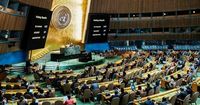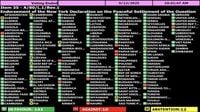The United Nations General Assembly delivered a resounding message on September 12, 2025, voting overwhelmingly to endorse a declaration that lays out concrete, time-bound, and irreversible steps toward a two-state solution between Israel and Palestine. The move, which comes at a critical juncture in the decades-long conflict, was backed by 142 countries, with only 10 voting against and 12 abstaining, highlighting a broad international consensus—at least on paper—about the urgent need for a path to peace.
This declaration, the product of a high-profile international conference at the UN in July 2025 hosted by Saudi Arabia and France, represents a renewed push by the global community to end the violence that has devastated both Israelis and Palestinians. Notably, both the United States and Israel boycotted the July conference, signaling their deep reservations about the process and outcome. According to Reuters, the declaration was already endorsed by the Arab League and co-signed by 17 UN member states, including several Arab countries, before the General Assembly vote.
The seven-page document, now officially endorsed by the 193-member General Assembly, is remarkable for its explicit condemnation of violence on both sides. It denounces the October 7, 2023, attacks by Hamas against Israel, which left approximately 1,200 people dead and resulted in about 251 hostages, according to Israeli figures. The declaration also condemns Israel’s subsequent military campaign in Gaza, which local health authorities report has killed over 64,000 people—most of them civilians—since the war began. The resolution calls out the siege and starvation tactics used in Gaza, describing them as having caused a “devastating humanitarian catastrophe and protection crisis.”
French Foreign Minister Jean-Noel Barrot emphasized the importance of the resolution, stating on X (formerly Twitter), “For the first time today, the United Nations adopted a text condemning [Hamas] for its crimes and calling for its surrender and disarmament.” This, he argued, marked a turning point in the international community’s stance, securing the isolation of Hamas and addressing a longstanding Israeli objection that the UN failed to condemn the group by name.
The declaration’s language is unambiguous: “In the context of ending the war in Gaza, Hamas must end its rule in Gaza and hand over its weapons to the Palestinian Authority, with international engagement and support, in line with the objective of a sovereign and independent Palestinian State.” Palestinian vice president Hussein al-Sheikh welcomed the decision, saying it “expresses international willingness to support our people’s rights and constitutes an important step towards ending the occupation and achieving our independent state,” as reported by PassBlue.
The resolution’s passage comes ahead of a highly anticipated gathering of world leaders on September 22, 2025, on the sidelines of the UN General Assembly’s high-level week. During this meeting, several countries—including the UK, France, Canada, Australia, and Belgium—are expected to formally recognize a Palestinian state. Currently, about three-quarters of UN member states recognize the Palestinian state declared in 1988 by the exiled Palestinian leadership, but ongoing violence, expanded Israeli settlements in the West Bank, and Israeli officials’ stated desire to annex the territory have cast doubt on the viability of a two-state solution.
Despite the strong international support, the vote exposed deep divisions. The United States and Israel voted against the resolution, joined by Argentina, Hungary, Micronesia, Nauru, Palau, Papua New Guinea, Paraguay, and Tonga. Iraq, Iran, and Tunisia abstained or did not vote. The United States sharply criticized the resolution, with US diplomat Morgan Ortagus telling the General Assembly, “Make no mistake, this resolution is a gift to Hamas. Far from promoting peace, the conference has already prolonged the war, emboldened Hamas and harmed the prospects of peace in both short and long term.” The US described the vote as “yet another misguided and ill-timed publicity stunt” that undermined serious diplomatic efforts to end the conflict.
Israel, for its part, dismissed the declaration as one-sided theater. Israel’s UN Ambassador Danny Danon stated, “The only beneficiary is Hamas… When terrorists are the ones cheering, you are not advancing peace; you are advancing terror.” Israeli Prime Minister Binyamin Netanyahu, speaking the day before the vote, reiterated his government’s position: “We are going to fulfill our promise that there will be no Palestinian state.” Such statements underscore the formidable obstacles facing international efforts to broker a lasting peace.
The declaration also calls for the immediate end of the war in Gaza and supports the deployment of a temporary international stabilization mission, to be mandated by the UN Security Council. This proposal is seen by many diplomats as a necessary step to create the security conditions for rebuilding and reconciliation, though it remains unclear how such a force would be deployed given the current hostility between the parties and the lack of consensus among major powers.
Meanwhile, the humanitarian situation in Gaza continues to deteriorate. On September 12, 2025, Olga Cherevko, spokesperson for the UN Office for the Coordination of Humanitarian Affairs (OCHA) in Gaza, gave a stark briefing from Deir al-Balah in central Gaza. Following Israel’s evacuation order for Gaza City, she reported, “The unmistakable smell of death is everywhere – a grizzly reminder that the ruins lining the streets hide the remains of mothers, fathers, children. Humans who once laughed, cried, dreamed. Their lives cut short by the war’s killing machines, many to never be found again.”
Other UN business this past week has also been overshadowed by the ongoing crisis. On September 9, 2025, Secretary-General António Guterres condemned Israel’s violation of the sovereignty and territorial integrity of Qatar, a key mediator in ceasefire negotiations. The UN Security Council issued a rare statement of unity condemning strikes in Doha, expressing deep regret at the loss of civilian life, though notably without naming Israel as the perpetrator.
The General Assembly’s 80th session, which began on September 9, 2025, also saw Annalena Baerbock sworn in as president—only the fifth woman to hold the post since 1945. The Assembly is currently in the process of selecting a new Secretary-General for the 2027-2031 term, a decision that could shape the UN’s approach to the Middle East for years to come.
As the world watches the UN’s next moves, the stakes could hardly be higher. With tens of thousands dead, millions displaced, and the political horizon clouded by entrenched positions, the General Assembly’s vote is a bold, if fraught, attempt to reset the narrative. Whether it marks the beginning of a genuine diplomatic breakthrough or yet another chapter in a long history of missed opportunities remains to be seen.


